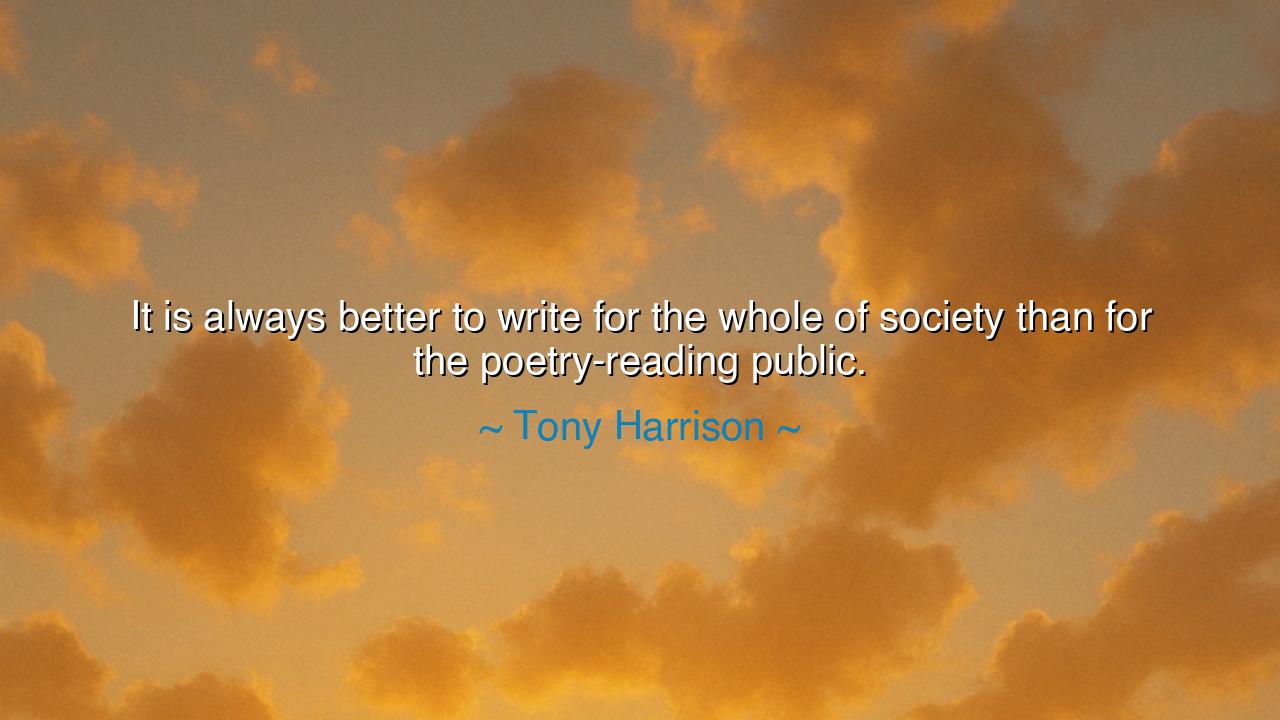
It is always better to write for the whole of society than for
It is always better to write for the whole of society than for the poetry-reading public.






The words of Tony Harrison—“It is always better to write for the whole of society than for the poetry-reading public.”—strike with the force of a reminder that art, if it is to live, must not be locked away in the chambers of the elite, but carried into the marketplace of all humanity. He speaks of the poet’s sacred duty: not merely to delight the few who already know the language of verse, but to speak to the many, to the workers and the weary, the broken and the hopeful, the rich and the poor alike. For what use is poetry if it is confined to a circle of connoisseurs? Its true purpose is to awaken the heart of society itself.
The ancients understood this truth. The poet was not a recluse whispering to a chosen few, but a herald who spoke to the people. Homer sang for all of Greece, not merely for aristocrats; his verses carried on the lips of peasants and kings alike. Likewise, in Rome, Virgil’s Aeneid was recited in public squares and used to shape a people’s vision of themselves. Poetry in its highest form was not private entertainment—it was the voice of a civilization. Harrison, in his time, sought to revive this ancient calling: to write not for the narrow circle, but for the broad expanse of society.
History offers us the proof of this wisdom. Consider the example of Pablo Neruda of Chile. Though a master of exquisite lyricism, he did not remain aloof. He wrote odes to simple things—bread, tomatoes, the hands of workers—so that his poetry belonged not only to scholars but to the people themselves. His verses were recited in protests and sung in fields. He embodied Harrison’s truth: that to write for the whole of society is to make art a tool of unity, dignity, and shared humanity.
Harrison himself was shaped by the knowledge that poetry often risked becoming an ivory tower pursuit. He rebelled against this confinement, determined that his words should be understood by those outside the academy, those whose lives rarely touched books of verse. For he knew that poetry divorced from the people is poetry without power. To write only for the poetry-reading public is to speak into a small echo chamber; but to write for society is to give voice to its struggles, its joys, its longings.
This teaching is not only for poets, but for all who create. Whatever your gift—whether words, art, science, or service—do not hide it among the few who already appreciate it. Offer it to the whole. Speak in ways that reach the masses, not merely the initiated. For the true worth of creation is measured not by exclusivity but by impact, not by applause from the few but by the transformation of the many. Art that belongs to all is art that endures.
The lesson for us is profound: strive always for universality. Whether you write, teach, or lead, aim to touch the soul of the common person. Speak plainly, not to diminish your truth but to magnify its reach. For wisdom wrapped only in riddles remains hidden; but wisdom spoken clearly becomes a torch passed from hand to hand.
Practically, this means writing, creating, and speaking with accessibility in mind. Share stories that resonate with human struggle, not only with intellectual discourse. Lift your voice in service of justice, compassion, and shared humanity, rather than crafting beauty only for the cloistered. In doing so, you honor the true purpose of your gift: to strengthen the bonds of society.
Thus, Harrison’s words remain a timeless charge to all creators: “It is always better to write for the whole of society than for the poetry-reading public.” Do not fear to descend from the ivory towers, for in the streets, the fields, and the hearts of ordinary people lies the true stage of the poet. To speak for all is to live for all, and to live for all is to create work that endures beyond your years, becoming not just poetry, but the heartbeat of a people.






AAdministratorAdministrator
Welcome, honored guests. Please leave a comment, we will respond soon